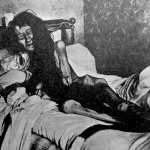
pic credit – altered dimensions
You thought your mom was a real bitch? This girl got ‘time out’ for 25 years! In an attic!
Mademoiselle Blanche Monnier was a very pretty young woman. People who knew her called her ‘joyous’ and remarked often on her ‘bounty of beautiful locks’ and the ‘brilliance’ of her eyes.
She lived at 21 rue de la Visitation Street in a wealthy neighborhood of Poiters, France with her brother, Marcel Monnier, who was a law-school graduate, and her parents, the highly regarded Emile Monnier, the head of a local arts facility and Madame Louise Monnier – Demarconnay. The Monnier’s were a local, upper middle-class family that was well known and well liked in the community and were of such kind that they had even earned the ‘Committee of Good Works’ award that was given to citizens who ‘displayed the highest of virtues.’
To say that Blanche lived ‘the good life’ would be understating the fact. And to make things even better, Blanche was in love. At twenty five, Blanche fell head over heals for a lawyer who lived in the area and happily made it known that she intended on marrying him, much to the chagrin of her mother.
The lawyer, it turns out, was much older than Blanche and worse yet, he was penny-less! Neither fact sat well with the high society sitting mother and a battle was soon raging between the two women. When simply ‘demanding’, that her daughter part ways with the man, didn’t work and pleading and begging were getting her nowhere, Madame Louise took another avenue to ensure that her daughter never marry a good-for-nothing and tarnish their family’s good name.
One evening, with the help of her son, Madame Louise, determined to stop the wedding, tricked Blanche into an upper attic room and then pad locked her in, promising only to release her when she swore to end the relationship.
And by golly she did just that! Blanche was apparently determined, at least at first, not to cave to her mother’s will, and so remained in that pad locked, shuttered and sunless room quietly. But, after a while, neighbors will recall hearing Blanche beg to be released, stating her imprisonment was unfair punishment, pleading for mercy. But, because she would not swear to give up her one true love, Louise would not open the door. And she would not open it for the next 25 years! Even after the lawyer had died in 1885, Madame Louise kept her daughter trapped in the attic that had become her prison.
That is until May 23rd of 1901. On that day, an anonymous letter arrived at the Paris Attorney General’s office.
It read: “Monsieur Attorney General: I have the honor to inform you of an exceptionally serious occurrence. I speak of a spinster who is locked up in Madame Monnier’s house, half starved, and living on a putrid litter for the past twenty-five years – in a word, in her own filth.”
The police were a bit taken aback by the accusation of the letter, as they knew the 75 year old Madame Louise and had known her husband, Emile, who had died in 1879, as prominent and proper people. However, there was the one nagging fact that young Blanche had disappeared one day some 25 years ago and, with seemingly no upset to the family, had never been seen again. The authorities had not even been notified of her disappearance and it soon came to be a subject of the distant past. The attorney general’s office instructed the police to investigate the allegations.
Police arrived at 21 rue de la Visitation Street and was met by an unanswered rap. When Madame Louis would not allow them to enter by invitation, they broke the door down. Following the lead that was given in the letter, the police made their way to the upper levels of the house and, following the stench that hung in the air, soon found the padlocked door.
A witness to the discovery of Blanche had this to say of those moments:
“We immediately gave the order to open the casement window. This was done with great difficulty, for the old dark-colored curtains fell down in a heavy shower of dust. To open the shutters, it was necessary to remove them from their right hinges. As soon as light entered the room, we noticed, in the back, lying on a bed, her head and body covered by a repulsively filthy blanket, a woman identified as Mademoiselle Blanche Monnier. The unfortunate woman was lying completely naked on a rotten straw mattress. All around her was formed a sort of crust made from excrement, fragments of meat, vegetables, fish, and rotten bread. We also saw oyster shells and bugs running across Mademoiselle Monnier’s bed. The air was so un-breathable, the odor given off by the room was so rank, that it was impossible for us to stay any longer to proceed with our investigation.”
As the officers stared on at the poor soul before them, the figure, terrified and obviously deranged, having not seen the sunlight for 25 years, buried her face in a disgusting blanket and pulled her 55 pound body into a tight ball on the urine and feces stained straw mattress that she lay upon.
As the officers in the attic quickly wrapped a blanket around the frail woman and rushed her to the hospital in Paris, others were searching the rest of the house and came across Madame Louise sitting in the living room and Marcel in his office. Both were taken in for questioning and promptly arrested.
Within 15 days of being jailed, Blanche’s mother, Madame Louise Monnier -Demarconnay, died of a heart attach, her last words being, “Ah, my poor Blanche!”
Marcel, who was being accused of being his mother’s accomplice in the cruel act of his sister’s imprisonment, would now have to stand trial alone. He stated that Blanche had lost her mind and at no point could she have not escaped that room. He, likewise, had done nothing to stop her escape. She (Blanche), he had stated, chose to remain trapped of her own accord. Be that as it may, he was found guilty and sentenced to 15 months in prison. He immediately appealed the verdict and, on November 20th, was found by the court of appeal ‘to have exercised no violence on or toward the woman (Blanche) and was thereby acquitted and released from jail.
At the hospital, Blanche was washed and dressed and given a room. Over a period of time, she did gain weight and the ability to sit in a room with the window drapes drawn open, but she never did lay claim to her sanity again. She died in a psychiatric hospital in 1913, 12 years after her rescue.
The identity of the person who penned the letter, that ultimately freed Blanche from her prison, has never come to light. Some have theorized that it was her brother, Marcel, who sent the letter to the authorities and not for the perfectly right reasons either. Marcel, knowing that their mother was growing frail and would not live long, realized that he would be left with the dirty little secret in the attic and thereby transforming him into his sister’s caregiver and, more correctly, her jailer! He decided, it is suggested, to get the family secret out in the open somehow, before it all came laying at his doorstep and honestly then making him a willing accomplice to what had obviously, over the years, turned into a very real crime. By exposing the truth under his mother’s watch, he would be able to claim his innocence in the whole mess and live out his life with neither being a further burden on him. And that is exactly what happened.
Less cynical souls believe that a household servant leaked it to a new boyfriend, who could have cared less about the high and mighty Monnier’s, and he wrote the letter, sent it to the authorities and let the chips land where they may.
Hard to say. I just hope Mademoiselle Blanche Monnier was a beloved Queen in her next life time and that she found the Prince Charming lawyer she’d always loved.













































